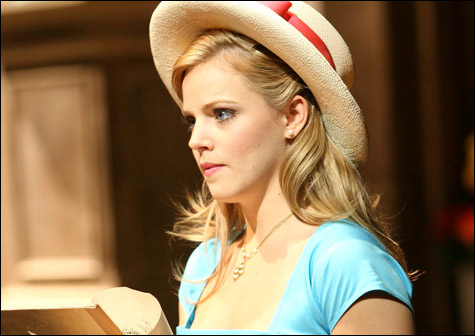
THE LIGHT IN THE PIAZZA: Katie Rose Clarke is a lustily breathless Clara.
|
The Light in the Piazza (at the Colonial Theatre through June 9) is an ambitious if old-fashioned musical, in which composer Adam Guettel reaches back to pat his grandfather, the legendary Richard Rodgers, while rubbing the Sondheim in his belly. Guettel won a 2005 Tony for the soaring score of this romantic fable based on Elizabeth Spencer’s 1960 novella, which is set in 1953 Florence, where autumn leaves fly through the loggia and the light of the title turns everything golden. (It was made into a 1962 movie starring Olivia de Havilland, Yvette Mimieux, and George Hamilton.) And he deserved it; the music, rapturously orchestrated by Guettel and Ted Sperling, seeks to capture the feeling more than the circumstances of the young love that springs up between a vacationing American and the handsome Florentine who captures her fly-away hat in the opening scene. But since the 26-year-old “girl” is traveling with her overprotective mother, a Winston-Salem matron brought by her child’s ecstasy to a rude awareness of the aridity of her own marriage, Guettel gets to contrast the swell of the harp strings with some piquantly embittered dissonance.
Certainly The Light in the Piazza’s greatest grace is its music, the loveliest written for Broadway in years. There are those who complain that, apart from the score, the show’s a bit of a muddle. Not so to these eyes and ears: librettist Craig Lucas and director Bartlett Sher are also in on the plan to make a musical that’s about emotion, not plot. And when the plot has to do with the heroine’s having been kicked in the head by a Shetland pony on her tenth birthday, what’s wrong with that? It’s true that it’s hard to tell from this hormone-gushing gloss on Romeo and Juliet just what’s wrong with the nubile Clara, whose overt difficulties do not extend beyond a tendency to be overwhelmed or overenthusiastic. But the musical — a liberal share of whose lyrics and libretto is in Italian — audaciously demonstrates how chemistry trumps communication in affairs of the heart, and it suggests that, since love fades, whether with the perfect or the imperfect stranger, you’d best drink in the light while you can.
Christine Andreas heads up the touring cast as the evolving Margaret Johnson, done up by costume designer Catherine Zuber in a series of period suits perfectly accessorized by hats, gloves, and heels. The character deepens from caricature — the prim Southern mom inserting herself between Katie Rose Clarke’s lustily breathless Clara and the ebulliently smitten Fabrizio of David Burnham — into a mix of self-doubt and self-knowledge that’s expressed in “Dividing Day,” in which she wonders just when her marriage went cold, and “Fable,” the jumble of cynicism and hope that brings down the curtain. The supporting roles — including those of Fabrizio’s extended Italian family — are reedier, but the cast plumps them up with emotional singing that runs the gamut from anger to amore. And Burnham, in particular, brings formidable pipes to the table. Still, this melodic throwback to the golden age of Grandpa Rodgers makes one rue the amplification that puts such a blare on the singing. How lovely it would be to appreciate the lush natural sound, as well as the lush natural light, in the Piazza.
Who knew there was so much Ritalin for the taking in the Oregon Territory? Or that it reacted so well with testosterone? The athletic revival of Seven Brides for Seven Brothers that has set down at North Shore Music Theatre (through June 17) makes you wonder why the 1982 stage musical based on the 1954 film lasted only five performances on Broadway. This co-production with Houston Under the Stars and Paper Mill Playhouse has been restaged for the NSMT arena, with set designer Anna Louizos’s imposing fabric tree trunks capable of being retracted till they look like wrinkled elephant’s feet peeping through the flies, so there’s plenty of room for Patti Colombo’s muscular choreography. No one gets kicked in the head by a pony, but a whack in the noggin would hardly interfere with one’s ability to romp through — or comprehend — this cornpone-and-calico-dripping tale of seven uncouth orphan brothers, in stature the opposite of the dwarfs, who read a little Plutarch, then skedaddle out to kidnap them some wives.
Al Kasha and Joel Hirschhorn supply one pretty ballad, “Love Never Goes Away,” but the best songs, lifted straight from the film, are by Johnny Mercer and Gene de Paul. These include the ecstatic “Wonderful, Wonderful Day,” the languorous “Lonesome Polecat,” and “Sobbin’ Women,” the twangy transposition of the rape of the Sabine women that gets the roughhousing Pontipee boys pumped up to do as the Romans did.